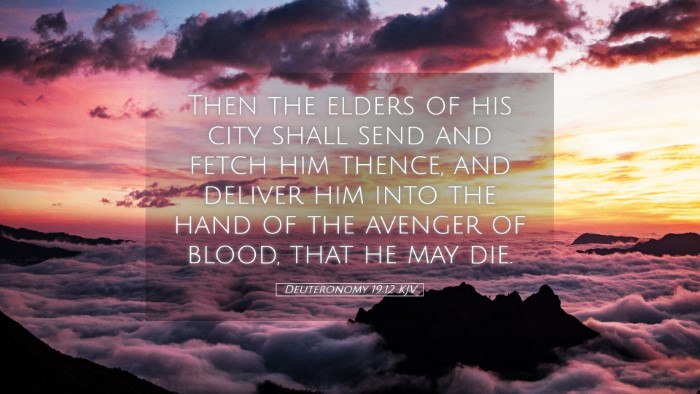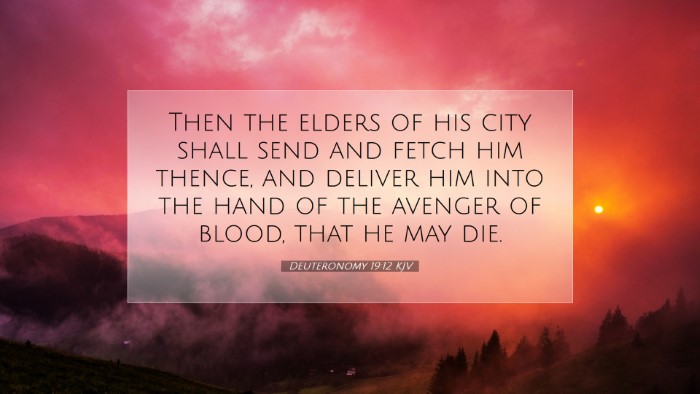Commentary on Deuteronomy 19:12
Deuteronomy 19:12 states, "Then the elders of his city shall send and fetch him thence, and deliver him into the hand of the avenger of blood, that he may die." This verse is situated within a larger context concerning cities of refuge and the laws regarding accidental manslaughter and intentional murder. This commentary synthesizes insights from historical interpretations, practical applications, and theological implications as understood by respected commentators.
Contextual Understanding
This verse addresses the procedures following a situation where an individual has committed an act leading to death. The cities of refuge were established as a provision for individuals who accidentally caused the death of another person (Deut. 19:1-10). The importance of this structure is grounded not just in judicial fairness but also in God’s mercy, highlighting the distinction between unintentional and premeditated actions.
- Matthew Henry: Henry emphasizes that the elders acted as representatives of the community, illustrating the communal responsibility in matters of justice and protection. He notes that the elders play a crucial role in ensuring righteous judgment.
- Albert Barnes: Barnes focuses on the legal framework surrounding these cities of refuge, arguing that they serve as a mechanism to prevent blood vengeance while still allowing the legal process to take its course. He remarks on the gravity of killing, even unintentionally, and the societal implications of such acts.
- Adam Clarke: Clarke elaborates on the theological implications, noting that this provision exemplifies God's justice balanced with mercy. He highlights the importance of intention, suggesting that the heart matters deeply in matters of sin and judgment.
Legal and Societal Implications
Verses such as Deuteronomy 19:12 shed light on the ancient Israelite legal system which sought to maintain order and preserve life. The process urged by this law is significant in understanding both punishment and protection.
- Judicial Process: The text requires that the case be brought before local elders. This requirement promotes a fair hearing and justice, preventing mob rule or personal vengeance.
- Community Involvement: The involvement of the elders signifies a collective societal role in administering justice, indicating that every member of the community has a stake in upholding the law.
Spiritual and Theological Reflections
The intricate balance of justice and mercy elucidated through this verse reflects broader biblical themes regarding sin, accountability, and divine justice.
- Justice of God: The verse serves as a reminder that God is just. Even cases of manslaughter are taken seriously and subjected to a judicial process, highlighting God's demand for righteousness in all situations.
- The Role of Intent: Clarke's emphasis on intention underscores the principle that God examines the heart (1 Sam. 16:7). This perspective invites deeper reflection on personal motivations and the nature of sin.
Practical Applications
Pastors and leaders can draw meaningful applications from this commentary as they navigate the challenges of justice and grace in their ministries.
- Moral Responsibility: This passage challenges individuals to consider their consequences and the weight of their actions, encouraging sensitivity in interpersonal relationships.
- Encouragement of Fair Justice: It calls for leaders to engage in equitable processes when addressing conflicts in their congregations, reflecting God’s character in their decision-making.
- Understanding Grace: Recognizing the significance of unintentional sin can also lead to a deeper comprehension of grace. Believers are reminded of the mercy available through Christ, who fulfilled the law's requirements.
Conclusion
Deuteronomy 19:12 encapsulates essential truths regarding justice and mercy within a community context. The thorough examination by historical commentators provides a richer understanding of the text, demonstrating its implications for legal practices, community ethics, and spiritual reflections.
This analysis serves to challenge and equip pastors, students, theologians, and Bible scholars as they delve deeper into Scripture, urging them to appreciate both the gravity and grace underlying God’s laws.


